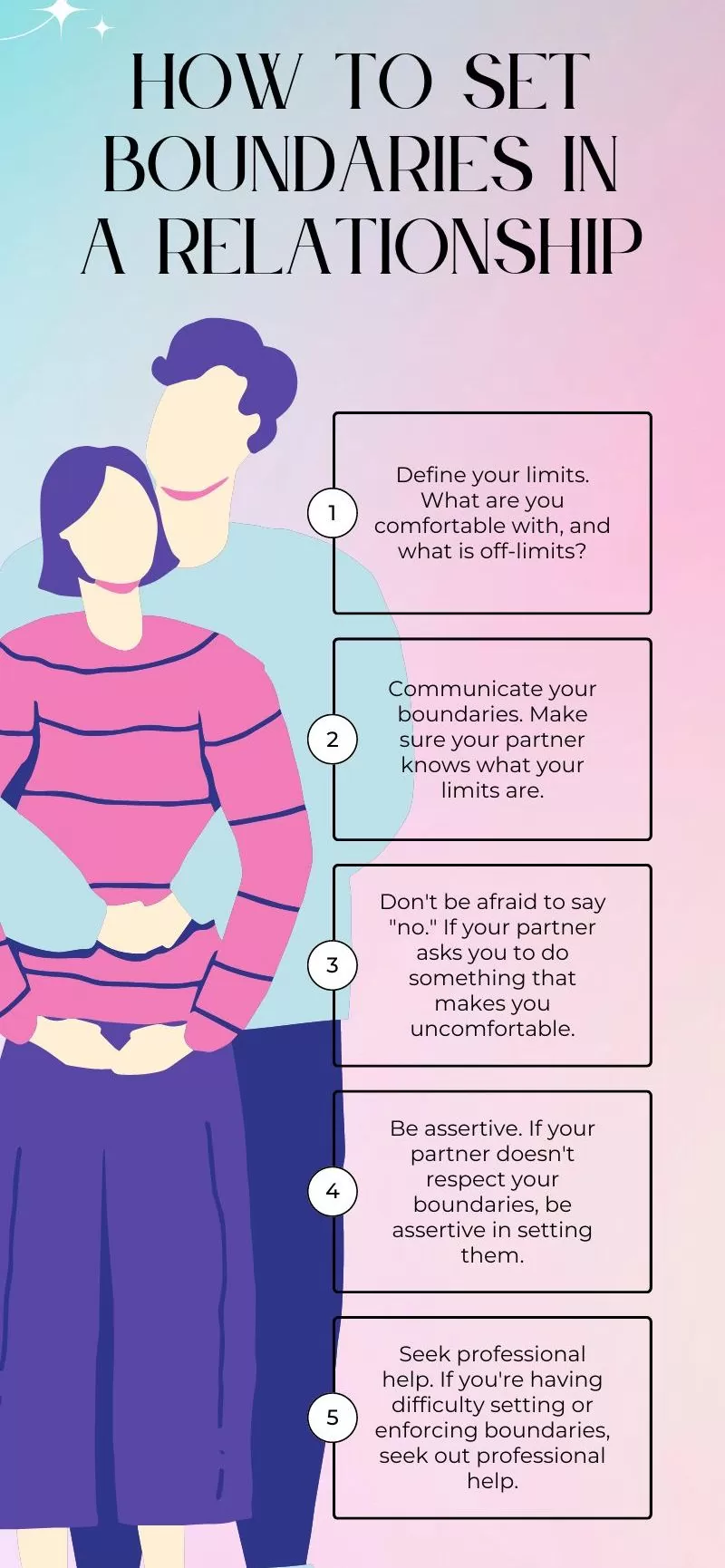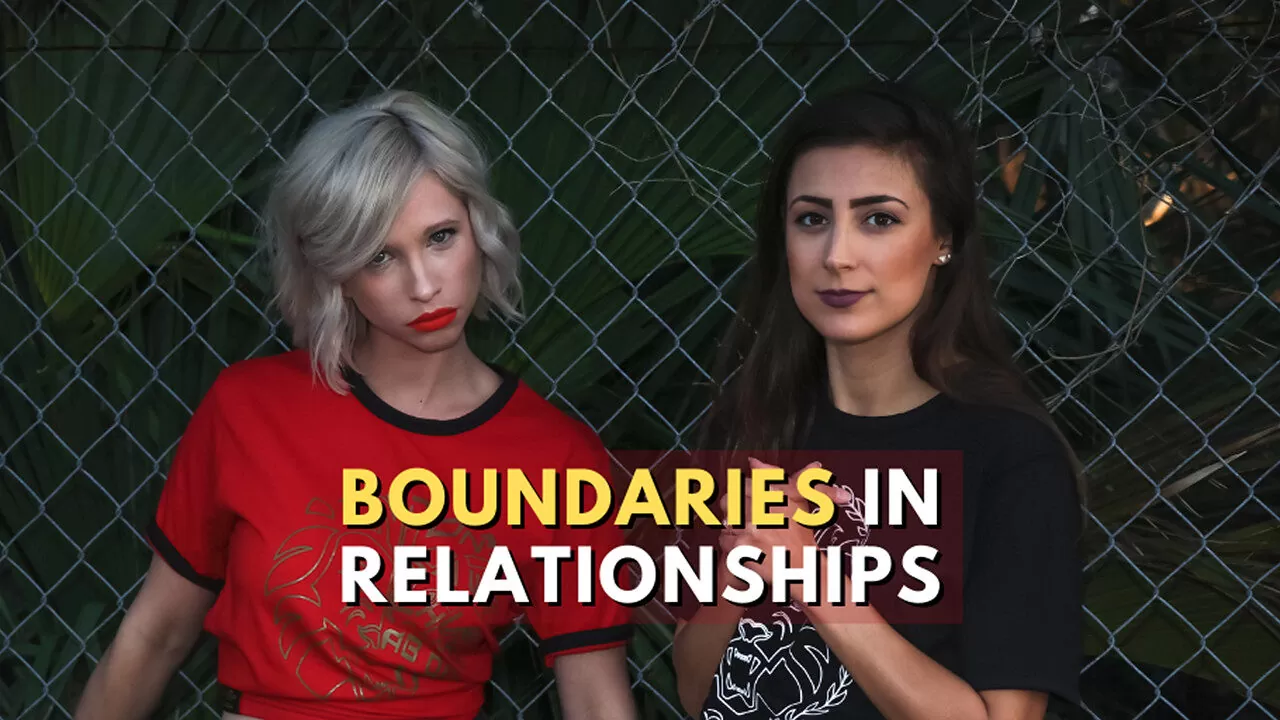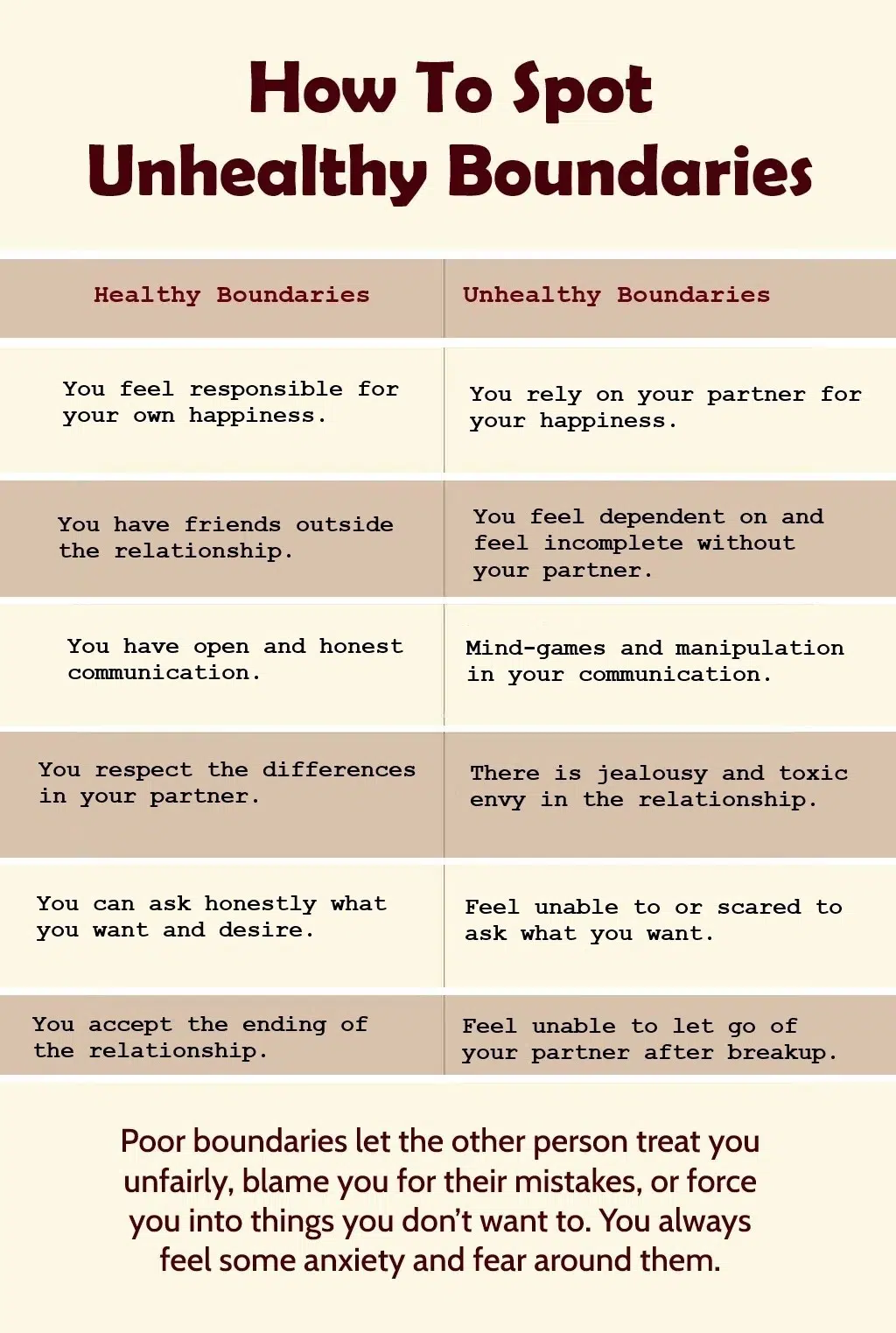Today's Saturday • 13 mins read
— By Dr. Sandip Roy.
Boundaries in relationships let you keep your identity without losing yourself or being controlling. Set these seven boundaries in all of your relationships for emotional safety and personal freedom.
John Donne, a 17th-century poet, wrote, “No man is an island…,” reminding us none of us is truly self-sufficient.
We need others for love, support, and belonging. Still, being in a relationship doesn’t mean surrendering your selfhood, autonomy, or uniqueness.
Healthy boundaries let you have meaningful connections while keeping the “you” in your relationships.
7 Relationship Boundaries To Set, Without Being Controlling
Boundaries protect you from being pushed into doing things you don’t want or having your personal space violated. They also let both people thrive without trying to control each other.
Set these boundaries in your relationships, whether they are close people or casual acquaintances:
- Financial or Money Boundary
- Emotional Boundary
- Personal Growth Boundary
- Digital Boundary
- Mental or Intellectual Boundary
- Physical Boundary
- Intimacy Boundary
1. Financial or Money Boundary
Setting money boundaries in relationships is an essential modern virtue.
Money that leaves your hands shifts control. I used to feel stressed asking friends to return money, and felt confused why they wouldn’t say a word about paying back.
I can’t undo past mistakes, but now I follow three rules when anyone outside my close family asks for money:
- Don’t lend money to friends. Loans to a friend or distant family member often cost you both the money and the relationship. Offer them other ways to help, such as advice or connecting them with resources.
- Loan what you can comfortably lend. Do not borrow or break your savings to lend them money. Always set clear repayment terms: timeframe, interest rate, and conditions if they fail to pay back.
- Only lend what you can afford to lose. If you doubt their ability to repay you, but still want to help them out of goodwill, lend only what you can afford to lose and won’t feel bad about it. Still, even when you’re giving them your hard-earned money without expecting it back, ask them when they can return it.
The golden question to always ask, “If I lend you money, when will you pay me back? And what steps can I take if you don’t?”
- Is it necessary to have a joint bank account with your spouse after your marriage? Yes, but you must also maintain your separate accounts.
- Should you always give money to your friends and/or family when they ask? No, especially when you cannot bear the financial stress on yourself. Strictly no when you know they are exploiting you.
- Is asking for a written agreement “unfriendly”? No, putting an agreement in writing in an email, a message (take a screenshot and save it), or a paper or electronic document, will help avoid future misunderstandings and disputes.
Money boundaries help you and your loved ones protect your resources and peace. They let you reach financial goals: build retirement savings, pay off debt, buy insurance, and keep an emergency fund..
- Don’t lend money unless you’ve checked your financial and emotional risks.
- Never feel obligated to give what you don’t have or to borrow for someone else.
- Don’t empty out your bank account for someone you’re dating or a distant relative.
- Stay prepared to say “no” without rudeness to anyone seeking help that involves money.
Three financial rules that Ramit Sethi (of I Will Teach You To Be Rich) gives:
- Save and invest a portion of all income. Save 10% and invest 20% of your income. You can adjust these numbers to fit your own situation. This straightforward habit can help build your emergency savings and eventually get rich.
- Set financial goals. Think deeply and write down what you want to achieve with your money. Do you want to buy a house? Pay off debt? Retire early? Once you know what you would like to achieve, you can start to plan to reach your goals.
- Automate your savings and investments. Set up automatic transfers from your checking account to your savings account and investments. This way, you won’t even have to think about it. This will help you stay on track with your savings and investments.

2. Emotional Boundary
Emotional boundaries put a fence around your feelings so that others can’t dismiss, belittle, or manipulate them.
What they do:
- Guard you from being told to “just get over” your difficult emotions.
- Free you from needing to explain or apologize for your feelings.
- Protect your happiness and peace.
What counts as a violation of your emotional boundaries: criticism, invalidation, name‑calling, unwanted endearments, prying into someone’s distress, or coercing you to discuss something you’re not ready to share.
Practical rules for setting your boundaries:
- Be specific about what you will and will not accept.
- Be firm, clear, and direct when enforcing your limits.
- Don’t negotiate basic limits meant to protect your well‑being.
- Don’t normalize violations. Don’t apologize for enforcing a boundary.
You can rebuff anyone who criticizes your feelings. You don’t owe anyone an apology or explanation for being upset or happy.
Notes on privacy and respect:
- You may choose not to share when coworkers or casual acquaintances ask why you’re upset; tell them it’s personal.
- You don’t have to tolerate language or terms that make you uncomfortable, whether they are socially accepted derogations or endearments.
Examples of what you may say:
- “I’m not comfortable discussing your family drama right now.”
- “I can’t talk about this tonight; let’s pick another time.”
- “I’m not available to hear you unload about X.”
- “I won’t accept being called names.”
Emotional boundaries let you keep your identity, reduce misunderstandings, prevent resentment, and make relationships safer and more respectful.
3. Personal Growth Boundary
This is also known as the boundary for personal space for growth.
Understand the importance of personal space. Personal space boundaries give you the flexibility and freedom to establish your personal priorities and balance the needs of yourself and others.
Healthy growth boundaries help cultivate respectful love for each other.
They are necessary in intimate and romantic relationships, as both people get to discover and learn more about themselves, thrive in shared experiences, and preserve personal expression and freedom of choice.
Your loved ones should know when it is wrong to interrupt you or ask you for certain things, so they do not hinder your personal growth and pursuits.
You can give priority to your goals and dreams, even within a romantic relationship or family, as long as it doesn’t come at the expense of your loved ones.
It also includes time boundaries, meaning how we manage our time. As they say, there’s a time to play. And there must be times for work, love, passions, and doing nothing.

Set your growth boundaries with your close people in these ways:
- Most relationships do not require full disclosure, and simply being together does not entitle them to demand that you disclose all of your passwords to them.
- Your family means the world to you, but you don’t have to sacrifice your personal growth aspirations to meet their needs and desires.
- You have to openly communicate your needs and desires to boundaries to people in your life, for living and growing with a free and fearless mind.
- Set clear expectations by discussing the amount of time, space, and energy you need to grow. Tell them in writing so there is little scope for misunderstandings and disputes.
- Be ready to politely decline if you don’t feel comfortable giving up your free time for something they are asking of you, unless it is an urgent situation. It is okay to say no and offer alternative ways/times to help.
- Encourage personal growth for both, allowing each other to recharge your emotional batteries, nurture your individuality and independence, and develop a sense of self-worth.
If someone is not giving you the freedom to grow, leave them. Your mental health is best served by cutting toxic people out of your life.
A little note: You have every right to set boundaries, and you never need to apologize for setting them.
4. Digital Boundary
The world is a global digital village today. Your presence or absence is no longer defined by physical walls and doors. This necessitates a new type of boundary: the digital boundary.
Set ground rules for online social interactions with loved ones, friends, and acquaintances. Establish and enforce boundaries for your fans, followers, and connections.
Start by asking yourself, “What do I like/dislike about my social media connections?”
Once you have the answers, open a conversation with them about acceptable online behavior.
Ask them:
- Can you stop tagging me in your posts?
- Can you not add me to a group chat without first asking?
- Can you stop going through my devices without permission?
Set clear digital boundaries by mutual consent in your romantic relationship. Ask the following:
- Do we need to announce on social media that we are dating?
- When is it okay to call or message each other at certain times?
- Do we have to reply every time, even when I feel it is unnecessary?
- Do we have to follow each other’s friends and relatives on social media?
- Do I have to like and comment on all your posts, even if I do not want to?
5. Mental/Intellectual Boundary
Intellectual or mental boundaries refer to thoughts, ideas, and opinions.
Everyone is different and has different perceptions and opinions. Healthy mental boundaries ensure we do not feel pressured to conform to someone else’s viewpoints.
These boundaries are violated when someone dismisses or belittles another person’s thoughts or ideas.
If someone feels strongly about an idea, ask them to back it up with facts and present it fairly and decently without belittling you or anyone else.
Don’t let anyone shout you down with their unproven opinions as final proof.
Request that they disagree with dignity. If they still try to parade their ideas as superior, making you feel trivial or stupid, leave the scene.
Mental boundaries protect your own mental wellness, and also show your consideration for the well-being of others.
Remember, you can always review your mental boundaries and adjust them as relationships evolve.
Your mental wellness comes before your social relationships.
6. Physical Boundary
Your body is yours, and only you decide who gets close to it.
Physical boundaries are meant to protect your body, privacy, and personal space. By setting physical boundaries, you show them how to respect your comfort and privacy.
This includes marking the line between your availability in private and public spaces. It makes clear what behaviors are acceptable, such as hugging or using personal items.
Most of us dislike people stepping on our privacy or getting too close to our personal space. To avoid that, we should set our physical boundaries.
- Do you hate others using your items? Then let them know.
- Do you dislike people hugging you? Then you must make it clear to them.
- Do you despise them talking about people close to you? Then tell them you feel it is wrong.

7. Intimacy Boundary
These boundaries refer to the degree of intimacy that people can have with you or the manner in which they can touch your body.
Do not use or tolerate provocative language in any context, not just the office or the class.
Do not use phrases that may be offensive to the other person, even if they are very close to you. Get their permission before using special words to express your love and concern for them.
They also include how people get to see your body, in real life or in photographs.
Healthy intimacy boundaries always include asking for permission before any socially intrusive touch or gesture, as well as understanding and respecting each partner’s limitations and desires.

Why You Must Have Boundaries In All Relationships
Boundaries create trust and respect in our relationships. Without them, no one knows where you start and where others end.
- Boundaries promote and maintain healthy relationships. They help people maintain their identity, mental health, and physical well-being. Healthy boundaries can also offer a sense of control over our emotional and physical space and time.
- Boundaries help protect personal space, which is a vital condition for personal growth and a full identity. They help individuals discover and learn more about themselves, while preventing them from becoming overly dependent on each other in the long run.
- Boundaries help prevent burnout and reduce stress levels. When we set boundaries, we prioritize our needs and values, which can help reduce the risk of emotional overwhelm, burnout, and resentment.
- Boundaries can prevent unnecessary disputes and psychological harm by making clear what is and isn’t acceptable to us. Without boundaries, individuals may feel resentful and exhausted.
Examples of Healthy Boundaries in Relationships
Emotional Boundaries Examples
- Saying no and asking for space.
- Not accepting guilt for mistakes you didn’t make.
- Finding out who you are outside of your relationship.
- Expecting kindness, communication, and respect from your partner.
- Gradually sharing personal information during the development of a relationship, instead of revealing everything to everyone.
Intellectual Boundaries Examples
- Respecting others, even if you don’t agree with their opinions.
- Having an awareness of what an appropriate discussion is in the setting you are in.
- Feeling safe to express your own ideas, so long as they do not infringe on the literal safety of others.
Financial Boundaries Examples
- Creating and adhering to a budget in all your relationships.
- Limiting how much you spend on your/their wants versus needs.
- Offering to cover a specific expense for someone, instead of handing over cash.
- Saying no to someone who frequently borrows money, if they have not returned past loans.
Intimacy Boundaries Examples
- Getting consent and respecting each other’s physical limitations.
- Communicating your intimacy preferences and aversions to your partner.
- Protesting and breaking contact if uncomfortable intimacy activities are initiated.
Personal Growth Boundaries Examples
- Communicating your time schedules to the people in your life.
- Setting aside time for self-care routines and hobbies.
- Limiting the amount of time you give to other people.
Healthy boundaries vs. Unhealthy boundaries:

Books on Boundaries
1. Boundaries: When to Say Yes, How to Say No to Take Control of Your Life by John Townsend and Henry Cloud
2. Boundaries: How to Draw the Line in Your Head, Heart and Home by Jennie Miller and Victoria Lambert
3. Establishing Boundaries: How to Protect Yourself, Become Assertive, Take Back Control, and Set Yourself Free by Patrick King
4. Setting Boundaries Will Set You Free: The Ultimate Guide to Telling the Truth, Creating Connection, and Finding Freedom by Nancy Levin
Final Words
Setting boundaries can be tough at first, but it is key to personal growth and healthy relationships.
Boundaries need periodic repairs, like garden fences, to let people know if they have started intruding or to inform them about our new expectations.
Of course, your loved ones know you better and have greater respect for your choices and decisions.
But boundaries in your relationships with them could help prevent many misunderstandings, hostility, and bitterness.
Leon Collier wrote a shorter, earlier version of this article. Rewritten, expanded, researched, and edited by Dr. Sandip Roy.
√ Also Read: How To Rebuild Trust After Cheating? (Clues From Research)
√ Please share it with someone if you found this helpful.
» You deserve happiness! Choosing therapy could be your best decision.
...
• Disclosure: Buying via our links earns us a small commission.
